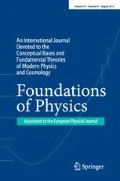Abstract
Sir K. R. Popper's experimental schemes challenge the Copenhagen interpretation of quantum theory, principally Heisenberg's indeterminacy relations and the EPR paradox. “The so-called Einstein-Podolsky-Rosen paradox is not a paradox. It is a theoretical statement in expectation of an interpretation,” says K. R. Popper in this interview. “My experiment ought to be a classical experiment. It is very simple and free from any additional assumption. It should really be done.”
Similar content being viewed by others
Notes and references
M. C. Combourieu, “Controverse autour de la définition de la réalité physique. Le paradoxe d'Einstein-Podolsky-Rosen (1935) et la non-séparabilité quantique”Dialectica, (to be published).
D. M. Greenberger, M. A. Horne, and A. Zeilinger, “Going beyond Bell's theorem,” inBell's Theorem, Quantum Theory, and Conceptions of the Universe, M. Kafatos, ed. (Kluwer Academic, Dordrecht, 1989), pp. 69–72.
N. D. Mermin, “Quantum mysteries revisited,”Am. J. Phys. 58, 731–734 (1990); “What's wrong with these elements of reality?”Phys. Today 43(6), 9–11 (1990).
See K. R. Popper,Quantum Theory and the Schism in Physics (Hutchinson, USA, 1982), 2nd edn., p. 28.
M. Horne, A. Shimony, and A. Zeilinger, “Two-particle interferometry”Nature (London) 347, 429–430 (1990) and references therein.
S. Rozental, ed.,Niels Bohr (Wiley, New York, 1967), p. 103.
K. R. Popper,The Logic of Scientific Discovery (Hutchinson, London, 1959); German title:Logik der Forschung (Springer, Vienna, 1935); French title:La logique de la découverte scientifique (Payot, Paris, 1973).
Ref. 7 (end of the books); see index 1 and 2.
A. Einstein, “Quantenmechanick und Wirklichkeit,”Dialectica 2, 320–324 (1949).
W. Heisenberg,The Physical Principles of the Quantum Theory (Dover, Chicago, 1930); German title:Die physikalischen Prinzipien der Quantentheorie (Verlag, Leipzig, 1930).
Ref. 10; p. 23 (English edition); p. 17 (German edition).
Ref. 10; p. 20 (English edition).
P. Eberhard thinks quantum theory is right. Thus he does not see any interest in perform it.
Ref. 1.
Author information
Authors and Affiliations
Rights and permissions
About this article
Cite this article
Combourieu, MC. Karl R. Popper, 1992: About the EPR controversy. Found Phys 22, 1303–1323 (1992). https://doi.org/10.1007/BF01889715
Received:
Issue Date:
DOI: https://doi.org/10.1007/BF01889715



